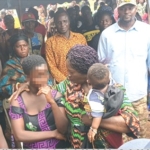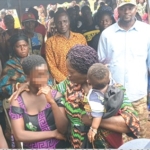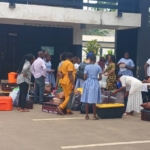
The cold, dark waters of the Volta Lake claimed 16 souls last Saturday (October 16), but within the crushing statistics lies a tale of devastating loss and miraculous survival centred on one single family.
In the blink of an eye, the familiar, necessary journey from Okuma Island to Debu for a funeral transformed into a catastrophic tragedy, highlighting the brutal risks of daily life on Ghana’s largest man-made lake.
The victims included four members of a single extended family: two siblings, their mother, and a young niece.
The terror of their final moments was witnessed by their own kin, survivors plucked from the clutches of the disaster by the sheer, desperate bravery of their 61-year-old patriarch.
The Voyage of 24: How a Simple Bucket Turned to Tragedy
The fateful boat, carrying 24 passengers—including the boat operator and his assistant—departed Okuma Island around 11:30 a.m. that Saturday.
Among those onboard was Belinda Ayikpa, an 18-year-old petty trader; her six-month-old son, Xorse Akpatsu, her mother, younger brother, sister, and her niece.
The boat operator was Ezugah Apenuzornya, Belinda’s grandfather, a man whose decades of experience navigating the vast, often treacherous waters of the Volta Lake had, until then, ensured safe passage.
The routine journey was tragically interrupted moments after setting off.
By the standard, often perilous, practice of Volta Lake transport, a crew member constantly scoops water out of the boat to prevent the cumulative weight from overwhelming the vessel.
In this instance, fate intervened in the most brutal way.
In the case of Belinda and her fellow travellers, the assistant’s bucket fell into the lake, upon which he drew the attention of the operator with loud shouts to stop.
In the subsequent scramble and sudden halt, the boat tilted violently to one side before finally capsizing, violently hurling all 24 passengers into the deep, churning waters.
The Grandfather’s Heroics and the Price of Survival
Amid the chaos and the desperate struggle of flailing bodies, it was the decades-old trade instinct of Ezugah Apenuzornya that determined who lived and who perished.
Belinda Ayikpa narrated the harrowing ordeal to Daily Graphic, her voice thick with emotion as she recalled the actions that saved her and her infant son.
“My baby and I were saved by my brave grandfather, Ezugah, who held me to hang on the overturned boat,” she recounted.
Strapped to her mother’s chest, Xorse Akpatsu, barely half a year old, survived the capsize and the subsequent struggle.
The grandfather’s strength and knowledge of the water allowed him to guide the mother and baby to the overturned hull, saving himself and two others in the process—accounting for three of the overall eight survivors.
But the survival came at an unbearable cost.
As she clung precariously to the wooden hull, powerless to help, Belinda could only watch the unthinkable unfold.
“I watched my mother, sister, brother, niece and other passengers perish.”
The eight survivors, guided by Ezugah, screamed until another passing boat responded to their desperate pleas, rescuing them after what felt like an eternity struggling in the lake.
A National Tragedy and a Cultural Twist
The grief reached the highest levels of government.
During the week, Vice-President Professor Naana Jane Opoku-Agyemang visited the Okuma Island community in the Kete-Krachi area of the Oti Region to commiserate with the bereaved.
She described the incident as a “national disaster” and announced immediate governmental interventions to ease the families’ pain.
Professor Opoku-Agyemang directly addressed the issue of safety, donating 650 life jackets sourced from various government agencies to aid safer transport on the lake.
Adding a final, poignant twist to the trauma is the unique local tradition of Okuma Island: persons who die by accident cannot be buried on the island community.
The deaths, considered a bad omen, necessitate the preparation of graves in “foreign areas”—a cultural mechanism, perhaps adopted by forebears, to process and distance themselves from such chilling disasters.
Appeal for Potable Water and Development
Amid the torrent of grief and official consolation, Belinda Ayikpa made a powerful appeal for basic necessities, illustrating the daily challenges faced by the island community.
She appealed to the government for an urgent source of potable water, noting that their community is tragically forced to rely on the very lake that claimed their loved ones.
She also pressed for the community to be connected to the national electricity grid to improve livelihoods and support small-scale businesses.
Finally, she highlighted the abysmal state of the community’s educational infrastructure:
“She said it was regrettable that there were only four teachers across all the stages of basic school in the community, where most of the children had to cross the river before reaching their school.”
This tragedy in the Volta Lake, while shocking, serves as a grim reminder of the critical need for infrastructure and safety upgrades in Ghana’s peripheral communities.
- President Commissions 36.5 Million Dollars Hospital In The Tain District
- You Will Not Go Free For Killing An Hard Working MP – Akufo-Addo To MP’s Killer
- I Will Lead You To Victory – Ato Forson Assures NDC Supporters
Visit Our Social Media for More



